News Edge
Nigeria,Latest news,Breaking news and commentary
Wednesday, March 25, 2015
News Edge: How to use natural remedies to control diabetes be...
News Edge: How to use natural remedies to control diabetes be...: How to use natural remedies to control diabetes better Here are details of five such herbal remedies that have shown promise of us...
How to use natural remedies to control diabetes better
Here are details of five such herbal remedies that have shown promise of useful anti-diabetic activity, along with what is known of their mechanism of action.
Fenugreek or methi
Used in paranthas and various Indian curries, methi has many health benefits. In recent times, clinical trials on people with type 2 diabetes show that fenugreek has the valuable property of reducing the rate at which sugar is absorbed from the stomach during the process of digestion; it also appears to be capable of stimulating the pancreatic cells to increase insulin production. Both these actions are believed to be a result of the action by an amino acid present in fenugreek called 4-hydroxyisoleucine.
How to use:
Soak the methi seeds in water overnight and drink this water and chew on the seeds first thing in the morning.
Place methi seeds in a skillet and dry roast using medium heat for about two minutes, with constant stirring. Allow the seeds to cool and then powder; add one teaspoon of this powder to hot or cold water and take once or twice in a day.
Boil one cup of water and add 2 tablespoons of methi seeds, steep for about 10 minutes and then strain and consume the liquid. Do this twice every day to see a reduction of blood glucose levels.
Bitter gourd, bitter melon or Karela
Several studies have found that bitter gourd or karela extracts have the ability to reduce the activity of the alpha glucosidase enzyme and this helps to reduce the hyperglycemia (increase in sugar levels) that typically follows a meal. This insulin-like action is believed to be due to a substance called polypeptide-P. Bitter melon has also been found to contain a phytonutrient called charantin that allows the glucose from the blood to be moved into the muscles, adipose (fat) tissue and liver, lowering blood glucose levels in diabetics.
How to use:
Select a green bitter gourd, slice it lengthwise, and scrape away the flesh to remove the seeds. Then add the vegetable to a blender and run it to obtain a juice. Drink one small glass of this juice first thing every morning.
Take some pieces of dried bitter gourd, boil in one cup of water and consume this tea once or twice in a day. This tea is not as bitter as the fresh juice and easier to consume.
Cut a few slices of bitter gourd and add to stir-fry dishes, especially in combination with vegetables that have a sweetish taste of their own – this will help mask their bitter taste. Here are more ways to include bitter gourd or karela in your diet.
Pterocarpus or Vijaysar
A deciduous tree that occurs widely in the Deccan peninsula in India, Pterocarpus marsupium of the Fabaceae family is considered especially useful in people with type 2 diabetes. Studies have found that pterocarpus extracts may be able to reduce the glucose absorption by the intestines, making it effective in diabetes type 2. This anti-diabetic action has also been noted in some clinical studies carried out on humans.
How to use:
Use a wooden glass made from the pterocarpus bark to store water overnight and drink the brownish-coloured water early the next morning. Replace the glass with a new one after about one month or whenever the water stops changing in colour.
Immerse a piece of pterocarpus wood in a glass of drinking water at night and drink the water the next morning. The same piece of wood can be used for two or three days.
Gymnema or Gurmar
As the name indicates, Gurmar is a climbing shrub and the leaves have been traditionally believed to be capable of destroying sugar. Gymnema leaves contain saponins and gymnemic acids that have anti-diabetic action. Studies have found that gymnemic acids show the ability to reduce the amount of sugar absorbed by the intestine during the process of digestion. Chewing on a few leaves of gymnema can reduce your power to sense the sweetness of foods and this observation has led researchers to conclude that this remedy may play a role in suppressing appetite – an effect that is useful to diabetics who seek to control their dietary intake. In some studies, gymnema also appears to increase the amount of insulin secreted by the pancreas.
How to use:
Commercially available as tablets and capsules, gymnema may also be made into a tea by boiling a handful of dry leaves in a glass of water, along with some cardamom to mask the bitterness. Add about one teaspoon of gymnema leaf powder when preparing green tea and drink once or twice in a day.
Guduchi or Amrit
Guduchi has been traditionally used as an adaptogen – a drug that increases the body’s ability to cope with stress and illness. Read more health benefits of Ayurvedic medicine — Guduchi. Extracts from the stem of this plant have been found to inhibit the activity of an enzyme called alpha glucosidase which is involved with the breakdown of glucose. This inhibition helps to delay the process of digestion of carbohydrates and therefore, glucose is absorbed much more slowly, an effect that is helpful in preventing hyperglycemia in diabetics.
How to use:
Wash and cut the fresh stem of a guduchi plant into thumb-sized pieces and store in water overnight. Mash the stems next morning and slowly drain out the water. Consume the starchy portion left at the bottom of the vessel, called sattva of guduchi. Alternatively, you can use the guduchi sattva capsules that are commercially available as per the recommended dosage.
While there are several drugs available to treat diabetes, the consensus in the medical fraternity is that medication ought to be an addition to a disciplined diet management and regular exercise program. This applies to herbal drugs too – merely changing over to a herbal remedy is not a final solution; regulating your diet and exercising regularly are still key to the effective management of diabetes.
for further explanation call: +2348127766558
Thursday, September 11, 2014
Nigerian Military, Yesterday And Today By Dr. Aliyu U. Tilde
The comparison between yesterday and today for the Nigerian
President and his military is truly odious. Nigerian leaders and indeed
its military need to take a long, hard look at themselves. What went
wrong and who are responsible for this state of shame?
Nigerian armed forces were under the simple going but honest President Alhaji Shehu Shagari as its Commander-in-Chief and the COAS or CDS was Wushishi (forgive my memory). The then GOC of the 3rd Division in Jos under whose command the Northeast fall was Maj. General Muhammadu Buhari. Surely, northerners dominated the top command positions in the military then.
Without hesitation, the GOC in Jos was given the signal to flush out the Chadians. But on his own, the stern Buhari was determined to, in addition, teach them a lesson they will never forget.
In a twinkle, Buhari mobilized his soldiers and personally led them in the field. Within few days Nigerian soldiers not only got the Chadians to flee but they chased the latter right into Chad. Buhari couldn't stop. It took quite some effort to get the soldier in him to pull the brakes. Later, he will claim that he didn't know that he was already deep into Chad.
Buhari the GOC had an excellent relationship with his soldiers. He never allowed superiors to oppress their juniors or edit their allowances. He was riding a 504 saloon car and lived in a simple bungalow along Bauchi road adjacent to the Unijos Main Campus. When he was appointed the head of state after the coup, his soldiers in the barracks went wild in happiness. He bade them farewell, not knowing that it will be forever.
Well the Chadians never dared encroaching into Nigeria again. Buhari has permanently imprinted a lesson in them: Nigeria is mighty and no rat should dare step in its foot. The success was possible because the military chiefs and officers then were truly Nigerian. They believed in their hearts, not in their words only, that that the territorial integrity of this nation is not for bargain, its military must be strong and well catered for, and money was not their goal.
 When the Maitatsine riots resurfaced in the Northeast during his regime,
Buhari was the C-in-C and the story of how they were crushed ended in
the burial of that sect forever.
When the Maitatsine riots resurfaced in the Northeast during his regime,
Buhari was the C-in-C and the story of how they were crushed ended in
the burial of that sect forever.No insurgency in Northern Nigeria surfaced again until when Obasanjo came to power. Like a joke, a group calling itself Nigerian Taliban surfaced in Yobe state. It engaged the police and the authorities in fights using guns and explosives. It was unbelievable. They were overcome but not wiped out. They had the chance to shift their base to Maiduguri and get patronised by the governors of Yobe and Borno states who gave them positions in government as a strategy of appeasement.
But the group couldn't be appeased. It continued to organise itself and train for a showdown to the full knowledge of the authorities in Abuja and at the dismay of the then SSS Director, Gadzama, who was from Borno and knew the risk his community and the nation at large would face in future.
When I raised this point at a conference in Kano, one of the former governors involved tried to discredit me, something I immediately objected to. These are facts, hard facts. Obasanjo as the C-in-C didn't do enough. By the time Yar'adua made an attempt to suppress the group extrajudicially, it was too late and, he too, didn't live a year longer than Muhammad Yusuf.
The death of Yar'adua was a loss for the nation and its military. He gave the Niger Deltan terrorists a choice between war and peace. They chose peace. He sacked the then Chief of Defence Staff then, Andrew Azazi, for his involvement in arming the Niger Deltans and playing the fifth columnist in the fight against them. An army investigation report warned the nation of the existence of politicians from that region who nurse secessionist ambitions and who could become leaders of the country one day. A probe into their activities and level of
involvement in the arms theft, the report said, was necessary to avoid putting our national security at risk. Yar'adua, unfortunately, didn't institute the probe that would have seen Jonathan impeached. And he died, shortly and sadly. Thus, those fears expressed in the COAS office report in the theft of armoury from Kaduna and Jaji depots became real.
Jonathan, a Niger Deltan, became President. He returned Azazi as his National Security adviser and with that a different course was charted for the military.
Now, Nigerians have seen what a different calibre of leader Jonathan is. Also, the world has witnessed the mettle of the people - from the former Eastern region - he has chosen to lead the military and fight the insurgency. Their estimation in the eyes of the world is very low. Never in our history has a Nigerian president been so much a subject of ridicule by world leaders and press. Never in the history of our military has it performed so disastrously bad in the protection of the Nigerian citizen and became a subject of international disdain and contempt to the extent that the Americans said they will not share intelligence with it. How could they do so when they knew among our military are sponsors of Boko Haram, as Stephen Davies recently disclosed. (And believe me I have not seen a soldier in Ihejirika because he instantly became rattled by the disclosure, failed to put even a faint defence but resorted to blaming the president and Elrufai for underfunding the military.)
From Ihejirika to Minimah, various international and local media reports have shown our soldiers as neglected, ill-equipped, underpaid and many of them sadistic - taking delight in torturing Nigerians and killing them - as we have seen in the reported massacres of Baga and the latest slaughter video which the authorities said they are still investigating.
The Nigerian military is certainly witnessing its lowest moments. Soldiers are deserting it, as the authorities themselves confessed, and in moments of attack on civilians, they are seen running along with civilians for their dear lives. In one or two occasions, they fled to Cameroon in their hundreds where they were disarmed, packed into schools and escorted, like women and children, back to Nigeria. They arrived Mubi looking haggard, hungry and in need of help. Even in the battles that saw the fall of towns like Gwoza, Banki, Gamboru, Izge, Damboa, Bama, Gulak, Michika and Bazza, our soldiers were seen outrunning civilians for safety as their officers outrun civilian elites in building posh houses and riding the latest brands of cars.
What a depressing moment for every true Nigerian! What a moment of truth for our military! It is not a time for denial or pride, as a diplomat put it last week, because there is nothing to deny and nothing to be proud of when bandits earlier described as "ghosts" by the President can now capture large towns and keep them, one after another, and get our soldiers fleeing.
The Chadian soldiers that we could easily liquidate in 1983 today, in contrast, stand with their shoulders high. Three weeks ago, when Boko Haram abducted some 85 Nigerians and moved them across to a forest in Chad, Chadian soldiers instantly located them, fought them gallantly and freed the hostages, handing them back to Nigeria. Chad, for God's sake! Our Chibok girks and other abductees on Nigeria continue to languish in the hands of Boko Haram for my months now, awaiting for a rescue that will never come. Their government tells them: "You see, we can't rescue you because we don't want to see you harmed. You're safer there." What an excuse!
Cameroon too has been defeating the insurgents at every encounter, sometimes even crossing the border to assist Nigerian soldiers as it was reported in Ngala two weeks ago. Even yesterday, they routed the insurgents at a border town where they killed more than 100 of the latter.
Nigeria, where are the GOCs like Buhari, the chiefs like Wushishi, and Presidents like Shagari? Where are your courageous commanders like Shagaya and Malu who as true Nigerians earned us respect in Liberia and Sierra Leone?
The present GOC of the same 3 DIV, Zaruwa, must prove his mettle to Nigerians. His hometown, Bazza, is in the hands of Boko Haram, and so is Michika and Gulak. We want to see the reinvention of Buhari, Malu or Shagaya in him. Incidentally, the Chief of Defence Staff, Barde, is from neighbouring Mubi, a town that is half-deserted as it awaits its turn in the invasion tsunami of Boko Haram. Its people have been fleeing to Yola in their thousands. He too, we want to see a Wushishi reinvented in him. Let us see in the duo the reinvention of the ancient, legendary Margi warrior. We hope, but only hope can we afford, that the C-in-C and the COAS will give them all the support they need.
The comparison between yesterday and today for the Nigerian President and his military is truly odious. Nigerian leaders and indeed its military need to take a long, hard look at themselves. What went wrong and who are responsible for this state of shame? If we are serious, heads must roll. We also need a different set of leaders and commanders that are truly Nigerians in their past and future.
The spokeman for the Nigerian military, Olukolade, said Nigerians should not be discouraged with these setbacks and lose hope in the military. But, sincerely, where can we find the courage, where can we see the hope?
Tuesday, September 9, 2014
Exclusive Video Shows Nigerian Army And Civilians Fleeing Boko Haram Attack Yesterday
The Nigerian army has struggled to contain the increasingly
aggressive attacks, the most recent of which occurred yesterday in Mubi,
and left 24 dead and many, including former president Obasanjo's son,
Lt. Col. Adeboye Obasanjo, gravely wounded. The militants also took an
armored tank in the attack.
Captured by a resident of Mubi Junction, Adamawa State
fleeing Boko Haram Monday, exclusive video has surfaced showing Nigerian
soldiers and civilians fleeing a massive Boko Haram attack in Michika.
Video of Nigerian Army And Civilians Fleeing From Boko Haram
Nigerian Army And Civilians Fleeing From Boko Haram Nigerian Army And Civilians Fleeing From Boko Haram
The incident comes after a string of attacks by the deadly sect, who has attempted to establish an Islamic state in northeast Nigeria. The Nigerian army has struggled to contain the increasingly aggressive attacks, the most recent of which occurred yesterday in Mubi, and left 24 dead and many, including former president Obasanjo's son, Lt. Col. Adeboye Obasanjo, gravely wounded. The militants also took an armored tank in the attack. See Also
 Former President Obasanjo's Son Shot In Mubi By Boko Haram
99 Comments
22 Hours Ago
Former President Obasanjo's Son Shot In Mubi By Boko Haram
99 Comments
22 Hours Ago
See Also
“This is a rebuttal from the information dissemination and sensitization unit of the Jamaatul Ahlil Sunna Lidawati Wal Jihad (Boko Haram) on the series of lies that the Nigeria military have been feeding the world on our recent conquests. Let the whole world know that we are on the path of victory because up to this minute, the town of Bama is under our control, the whole of Michika is now in our hands, as well as Manalapan (Junction of) Mubi is now fully under our control," the spokesman said.
Nigerian Defence Headquarters, while confirming counter-terrorism activity in Mubi on their Twitter account (@DefenceInfoNG) yesterday, did not offer further information about the alleged capture of Mubi and Michik
Monday, September 8, 2014
Shelling near two cities rocks fragile ceasefire in eastern Ukraine
Mariupol, Ukraine (CNN) -- Shelling hit areas near two key cities in eastern Ukraine on Sunday, intensifying fears that a ceasefire that took effect less than two days ago may be falling apart.
The fledgling truce
between the Ukrainian government and pro-Russian rebels began Friday
evening, and both sides were already accusing each other of violating it
by Saturday.
Sporadic artillery and
machine gun fire rang out in the early hours of Sunday on the outskirts
the strategic port city of Mariupol. A gas station was set on fire, and
cars carried wounded civilians down the roads.
Shelling and explosions
were also heard near the airport of the flashpoint city of Donetsk on
Sunday morning, the city council said on its website.
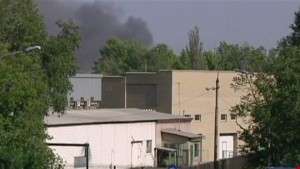 Will Ukraine ceasefire hold?
Will Ukraine ceasefire hold?
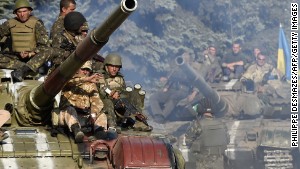 Ceasefire in Ukraine takes effect
Ceasefire in Ukraine takes effect
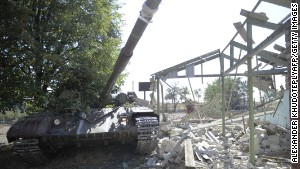 Explosions in Mariupol amid ceasefire
Explosions in Mariupol amid ceasefire
In both cities, the source of the weapons fire wasn't immediately clear.
The Mariupol city
government said that pro-Russian rebels had carried out the shelling
near the city overnight. It said one woman was killed and three people
wounded.
The Russian state news
agency ITAR-Tass late Saturday quoted rebel officials as saying that
Ukrainian forces continued to shell Donetsk and rebel positions near
Mariupol. The RIA Novosti news agency reported that four Donetsk
residents were killed in the shelling.
Ukrainian National
Security and Defense Council spokesman Col. Andriy Lysenko told
reporters in Kiev on Saturday that the situation was calmer than before
the truce, but that there had been a number of "provocations" by rebels.
They included 10 instances of shelling in the Donetsk and Luhansk
regions, he said.
In a sign the government
was still hoping to stick to the ceasefire deal, Lysenko said a prisoner
exchange would begin soon, although he didn't specify a time or date.
'So much confusion'
Ukrainian forces and
pro-Russian rebels have been locked in vicious fighting in eastern
Ukraine since April, leaving more than 2,200 people dead, according to
the United Nations.
The conflict has
triggered a humanitarian crisis in the region, where shelling has
destroyed homes and infrastructure. Nationwide, more than a million
people have been displaced from their homes by the fighting, most of
them in the East.
One old man in Mariupol shook his head gloomily when asked if he thought the ceasefire would last.
"There is so much
confusion," Gennady Andreyavich said. "We really don't know what will
happen, because when people say we must live in a united Ukraine and we
see at the same time Ukrainian forces in retreat -- what should we
think?"
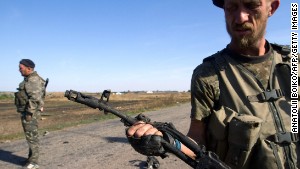 Swedish minister outlines Russia measures
Swedish minister outlines Russia measures
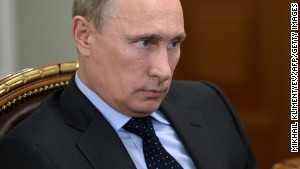 NATO to pressure Russia over Ukraine
NATO to pressure Russia over Ukraine
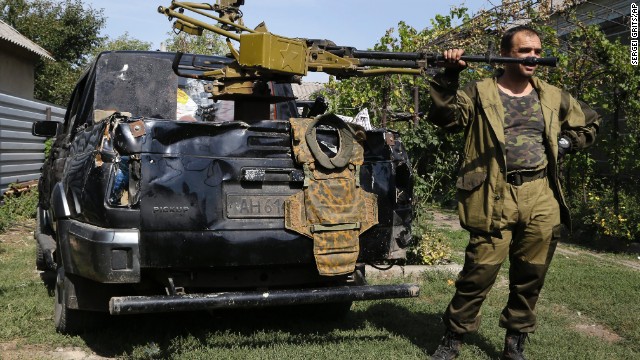 Photos: Crisis in Ukraine
Photos: Crisis in Ukraine
Ukrainian forces and the
rebels have engaged in fierce fighting over the past week in the
territory between the Russian border and Mariupol.
A previous unilateral ceasefire declared by the Ukrainian government in June broke down after 10 days.
Poroshenko and Putin talk
Ukrainian President
Petro Poroshenko had a phone conversation with Russian President
Vladimir Putin after the signing of the ceasefire deal in the Belarusian
city of Minsk, Poroshenko's office said Saturday in a statement.
The leaders agreed that
the ceasefire in eastern Ukraine has been mostly upheld and they
discussed further steps to make the truce last, the statement said.
Some areas at the heart of the conflict reported that calm was prevailing.
Luhansk city council
said that Saturday was the first day in over a month with no shooting.
The city office has started working on repairs to the power and water
supply.
Scottish independence campaign gaining ground, polls suggest
With less than two weeks to go until Scotland's referendum, polls suggest an increase in those favoring independence from the United Kingdom, with one survey for the first time putting the "yes" vote ahead.
On September 18, voters in Scotland will be presented with a simple yes/no question: Should Scotland be an independent country?
A "yes" vote would mean Scotland splits from the rest of the United Kingdom -- that is, England, Wales and Northern Ireland.
Activists on both sides are stepping up their efforts as the historic referendum approaches.
A YouGov poll conducted for The Sunday Times
and released on Sunday showed the "yes" vote at 51% and "no" at 49%.
The poll of 1084 voters excluded undecided voters and YouGov said the
numbers represented "a statistical dead heat."
YouGov President Peter Kellner said a 2-point gap was too small to
predict the outcome of the referendum but demonstrated that support for
the "Better Together" campaign had fallen "at an astonishing rate."
Four weeks ago YouGov put "no" at 58% and "yes" at 42%, Kellner said.
 Expert: Scottish vote hinges on economy
Expert: Scottish vote hinges on economy
 Scotland to decide on full independence
Scotland to decide on full independence
"The Yes campaign has not just invaded No territory; it has launched a blitzkrieg," he said.
Kellner said voters from
the Conservative party had continued to oppose independence but that all
other voters had moved closer toward a breakaway Scotland.
Meantime a Panelbase poll commissioned by Yes Scotland and also released Sunday suggested that 48% of voters supported independence -- excluding undecideds -- while 52% wanted to remain united.
A "poll of polls" compiled by ScotCen
-- before the latest YouGov and Panelbase surveys -- put the "yes" vote
for independence at 47% and the "no" vote at 53%. The company, which
describes itself as an independent social research center, said those
results were based on three polls from YouGov, two from Panelbase and one from Survation.
It also suggested that the "yes" vote was gaining momentum, while the "no" vote was losing it.
Former Gov. Ali Modu Sherif Was Arrested In Cameroon Over Obvious Links With Boko Haram But Nigeria Secured His Release - Falana
Radical Nigerian Lawyer, Femi Falana (SAN) has continued insisting and exposing how ex-Borno State Governor, Ali Modu Sheriff started the dreaded sect, Boko Haram in the Northeast. Falana stated that not only did Modu Sheriff start and fund Boko Haram for political purposes, but that the former governor appointed a Boko Haram leader, Baba Fugu Foi as a commissioner in his government
Falana then dared the ex-Governor to challenge him in a law court so that he can lay his evidence before a competent court of lawyer.
Subscribe to:
Comments (Atom)

